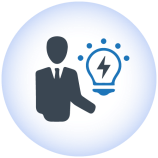Growth Marketing
Services & platforms
What Is Growth Marketing?
Growth marketing is a strategic approach focused on rapid and sustainable business growth by experimenting, analyzing, and optimizing all stages of the customer lifecycle. Unlike traditional marketing, which often concentrates on driving awareness and acquisition, growth marketing looks at the entire customer journey, from awareness to retention and advocacy.
#1 Award-Winning Agency
$800M+ Managed Ad Revenue

Are paid advertisements that businesses and individuals can create and display on LinkedIn, a professional networking platform. These ads are designed to reach a targeted audience based on factors such as job title, industry, company size, education, skills, and more. LinkedIn Ads are particularly effective for business-to-business (B2B) marketing, but they can also be used for recruiting, brand awareness, and driving website traffic.

Are a suite of advertising solutions provided by Amazon that allow sellers, vendors, and brands to promote their products directly on Amazon and other platforms within Amazon’s ecosystem. These ads can help businesses increase visibility, drive sales, and promote brand awareness by targeting shoppers actively looking for products. Amazon Ads are particularly effective because they reach customers at different stages of the purchasing process, from discovery to purchase.
Meta Ads, formerly known as Facebook Ads, are a type of online advertising that allows businesses to create and run ads on Meta platforms like Facebook and Instagram. These ads are designed to reach specific target audiences based on various criteria like demographics, interests, and online behavior. Meta Ads utilize different ad formats such as images, videos, and carousels, and are displayed in various placements within the Meta ecosystem.
Google Ads is a pay-per-click (PPC) online advertising platform where businesses pay to display ads on Google search results, YouTube, and other websites on the Google Display Network. It’s used to drive traffic, generate leads, and boost sales by targeting specific keywords, locations, and audiences.
Principles of Growth Marketing


Revenue Focus
Growth marketing targets the entire funnel: Awareness, Acquisition, Activation, Revenue, Retention, and Referral (AARRR).
The goal is not just to attract new users but to convert, engage, and retain them for long-term value.

Experimentation
Growth marketers use data-driven experiments to test new strategies, channels, and tactics.
Frequent A/B testing is used to find what works best for improving conversions, engagement, and retention.

Data-Driven Decision Making

Customer-Centric Approach
Growth marketing focuses on understanding and addressing customer needs at every touchpoint.
Personalization and relevance are key to engaging customers effectively.

Cross-Functional Collaboration


Acquisition Growth Strategies
Content Marketing: Create blogs, videos, or whitepapers to attract potential customers.
SEO: Optimize your website and content for search engines to drive organic traffic.
Paid Advertising: Use platforms like Google Ads, Facebook Ads, or LinkedIn to target specific audiences.
Social Media Growth: Leverage platforms like Instagram, TikTok, or Twitter to build brand awareness and drive engagement.

Activation Growth Strategies
Onboarding Optimization: Simplify and personalize the user onboarding process to ensure a smooth start.
Engaging CTAs: Use clear and compelling calls-to-action to guide users toward the next step.
Interactive Content: Create quizzes, calculators, or tools that provide value while driving interaction.

Revenue Growth Strategies
Upselling and Cross-Selling: Use personalized recommendations to increase customer spending.
Pricing Experiments: Test different pricing models to find the optimal point for revenue growth.
Sales Funnel Optimization: Ensure a seamless flow from landing pages to checkout.

Retention Growth Strategies
Email Marketing: Send personalized, value-driven emails to keep customers engaged.
Push Notifications: Deliver timely messages that encourage users to return.
Customer Support Excellence: Provide outstanding support to improve satisfaction and loyalty.

Referral Growth Strategies
Referral Programs: Incentivize existing customers to refer new users with rewards or discounts.
User-Generated Content: Encourage customers to share their experiences on social media.
Social Proof: Highlight reviews, testimonials, and case studies to encourage trust and word-of-mouth growth.
Metrics for Growth Marketing


Acquisition Metrics
Customer Acquisition Cost (CAC): How much it costs to acquire a new customer.
Traffic Volume: The amount of website or app traffic generated.
Click-Through Rate (CTR): Percentage of users clicking on ads or links.

Activation Metrics
Activation Rate: Percentage of users who take a key first action, like signing up or completing onboarding.
Conversion Rate: The proportion of visitors who complete a desired action.

Revenue Metrics
Monthly Recurring Revenue (MRR): Revenue generated on a recurring basis.
Average Revenue Per User (ARPU): Revenue generated per customer.
LTV (Lifetime Value): Total revenue expected from a customer over their lifetime.

Retention Metrics
Churn Rate: Percentage of customers who stop using the service.
Repeat Purchase Rate: Percentage of customers making multiple purchases.
Engagement Rate: How often and deeply users interact with your product or service.

Referral Metrics
Net Promoter Score (NPS): Measures customer likelihood to recommend your brand.
Referral Rate: Percentage of customers who refer others.
Social Shares: Number of times content is shared by users.